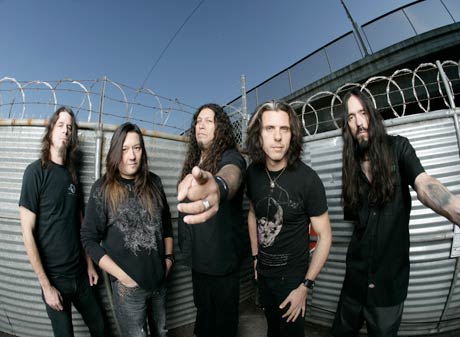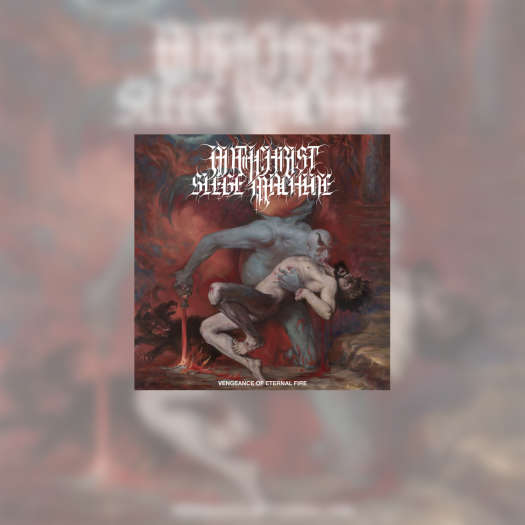San Franciscos Testament are revered for establishing the Bay Area subgenre of thrash metal alongside other equally-or-lesser-known entities such as Exodus, Death Angel and Forbidden. Yet over the course of almost 25 years, the band have never received their due. Once thought to be riding the same wave that spawned thrashs Big Four (Metallica, Megadeth, Slayer and Anthrax), the band faltered after their respected tertiary effort, 1989s Practice What You Preach with by-the-numbers affair Souls Of Black (1990) and never regained foothold. As years progressed, member departures, label shifts and other woes eventually affected releases, sending the band spiralling into oblivion. Even their own progressively heavier sound couldnt save them. Shifting from the hyperactive, shrieking attack of thrash into a more death metal-influenced style, Testament seemed lost. Surviving "classic-era members Eric Peterson (guitar) and Chuck Billy (vocals) struggled to regain lost ground. Theyve now finally found it. Ninth studio effort The Formation Of Damnation (out on Nuclear Blast) proves that with one crushing sweep of its overdriven guitars and relentless drumming. Bolstered by the return of key members Alex Skolnick (guitar)and Greg Christian (bass) as well as former Forbidden, Slayer and Testament yes, Testament drummer Paul Bostaph, The Formation Of Damnation sees new breath in the bands lungs as they finally find the perfect middle ground between their earlier thrash metal salad days and preferred death metal darkness. Easily their best effort in a decade then again, they havent put out anything new in that long - The Formation Of Damnation is a welcome return from one of metals unsung heroes.
The Formation Of Damnation is your first new recording in almost a decade. What was your primary goal when approaching it?
Peterson: We wanted to follow up [last studio effort, 1999s] The Gathering and beat it; learning everything we have with the modern sounds and heaviness but bring back the old school element. Of course, Alex brought the leads back, Im soloing more again and Chucks singing more. That was the initial idea.
It seems as though youve finally found the middle-ground between your definitive thrash years and the more death metal-influenced music youve been creating for a while now.
Yeah, theres elements of both of those. Songs like "Dangers Of The Faithless, which is metal and weird time signatures, more artsy-kinda metal. Theres straight-ahead old school stuff like "The Evil Has Landed, which could have been off Practice... or a heavier one off (1992s) The Ritual. "The Persecuted Wont Forget is a mixture of everything. Its probably the most epic one on there, going into so many different parts. Thats what I like about the band now. We get away from the intro/verse/chorus/lead over the verse. It works for some songs but its cool to have songs that go off on tangents.
After so much time away from writing together, how difficult was it to start? Did you intend for this amalgamation of old and new styles or was it a natural progression?
For me, its always gotta be heavy. Testament has a formula and I try to stick to it but push here and there. I go for things or sounds that move me as a metal fan instead of going, "Well, whats in right now? Weve never jumped on a bandwagon. If we ever fell victim to that, it was on The Ritual, where we were trying to be a more commercial Testament. Its a good record now that its said and done but its good to get past that. That was a great record but unfortunately the music scene leant more towards flannel shirts at that time.
Well, youre still around while many of the bands that usurped you are long gone. How does that feel?
Weve come back in a strong way. A lot of our peers that are still doing it not to mention names dont have that feeling. I dont hear it. I hear emotion but Im not like, "Wow. I think this record for us has that feeling. Its very true to heart.
You do seem to maintain the same passion on this album in later years as opposed to some of your contemporaries. How does that happen after a quarter-century?
The struggle in life. Weve never had a gold record... Were not poor but were not rich. We live paycheque to paycheque, struggling. I guess were still struggling. Im a metal fan in general though. I like the most extreme stuff which is why I have a black, atmospheric band Dragonlord. Im not going softer, Im going heavier.
Many people may comment that it took the return of Alex and Greg to bring the band back to speed.
I think those are the people who only acknowledge anything we put out with them though. We have fans that only know us for our heavier stuff from (1994s) Low and on. Those fans will still appreciate what were doing with this record while the older ones will feel familiar having Alex and Gregs sound and style back in the band. There are two sets of Testament fans who understand this record where before they were somewhat separate. Thats why I think this record is garnering so much attention... There are more people who can understand it.
Not to knock Paul Bostaph, but why wasnt (classic-era) drummer Louie Clemente in the picture for The Formation Of Damnation?
Well, Paul can play anything. Louie didnt do the record because of problems with tendonitis and carpal tunnel. There was demand to get the record done and some of the things I was introducing him to like the beginning of "The Persecuted..., he couldnt do. He wanted to compromise with punches and then going into the straight beat. I didnt want to compromise. I wanted the full Monty.
You seem adamant about not letting compromise affect the conviction of the album. Maybe that had a detrimental impact on past albums or the positive results on this one?
Most certainly. I really wanted (Louie) back but realised that to compromise wasnt being truthful to the music. We did that a lot with Souls Of Black and The Ritual. They could have been heavier and stronger but they were just straightforward drumming. It was kind of boring. The riffs were good but you needed a lot more behind them; a push that Louie wasnt doing. Its killer now... Id just have Paul doing drum solos. Theres no better choice. Hes from the same genre, started off at the same clubs with the same type of music. It makes too much sense. Besides, hes been unofficially in the band for 15 years. Its good to have him official other than as a borrowed drummer from Slayer when we needed him.
The Formation Of Damnation is your first new recording in almost a decade. What was your primary goal when approaching it?
Peterson: We wanted to follow up [last studio effort, 1999s] The Gathering and beat it; learning everything we have with the modern sounds and heaviness but bring back the old school element. Of course, Alex brought the leads back, Im soloing more again and Chucks singing more. That was the initial idea.
It seems as though youve finally found the middle-ground between your definitive thrash years and the more death metal-influenced music youve been creating for a while now.
Yeah, theres elements of both of those. Songs like "Dangers Of The Faithless, which is metal and weird time signatures, more artsy-kinda metal. Theres straight-ahead old school stuff like "The Evil Has Landed, which could have been off Practice... or a heavier one off (1992s) The Ritual. "The Persecuted Wont Forget is a mixture of everything. Its probably the most epic one on there, going into so many different parts. Thats what I like about the band now. We get away from the intro/verse/chorus/lead over the verse. It works for some songs but its cool to have songs that go off on tangents.
After so much time away from writing together, how difficult was it to start? Did you intend for this amalgamation of old and new styles or was it a natural progression?
For me, its always gotta be heavy. Testament has a formula and I try to stick to it but push here and there. I go for things or sounds that move me as a metal fan instead of going, "Well, whats in right now? Weve never jumped on a bandwagon. If we ever fell victim to that, it was on The Ritual, where we were trying to be a more commercial Testament. Its a good record now that its said and done but its good to get past that. That was a great record but unfortunately the music scene leant more towards flannel shirts at that time.
Well, youre still around while many of the bands that usurped you are long gone. How does that feel?
Weve come back in a strong way. A lot of our peers that are still doing it not to mention names dont have that feeling. I dont hear it. I hear emotion but Im not like, "Wow. I think this record for us has that feeling. Its very true to heart.
You do seem to maintain the same passion on this album in later years as opposed to some of your contemporaries. How does that happen after a quarter-century?
The struggle in life. Weve never had a gold record... Were not poor but were not rich. We live paycheque to paycheque, struggling. I guess were still struggling. Im a metal fan in general though. I like the most extreme stuff which is why I have a black, atmospheric band Dragonlord. Im not going softer, Im going heavier.
Many people may comment that it took the return of Alex and Greg to bring the band back to speed.
I think those are the people who only acknowledge anything we put out with them though. We have fans that only know us for our heavier stuff from (1994s) Low and on. Those fans will still appreciate what were doing with this record while the older ones will feel familiar having Alex and Gregs sound and style back in the band. There are two sets of Testament fans who understand this record where before they were somewhat separate. Thats why I think this record is garnering so much attention... There are more people who can understand it.
Not to knock Paul Bostaph, but why wasnt (classic-era) drummer Louie Clemente in the picture for The Formation Of Damnation?
Well, Paul can play anything. Louie didnt do the record because of problems with tendonitis and carpal tunnel. There was demand to get the record done and some of the things I was introducing him to like the beginning of "The Persecuted..., he couldnt do. He wanted to compromise with punches and then going into the straight beat. I didnt want to compromise. I wanted the full Monty.
You seem adamant about not letting compromise affect the conviction of the album. Maybe that had a detrimental impact on past albums or the positive results on this one?
Most certainly. I really wanted (Louie) back but realised that to compromise wasnt being truthful to the music. We did that a lot with Souls Of Black and The Ritual. They could have been heavier and stronger but they were just straightforward drumming. It was kind of boring. The riffs were good but you needed a lot more behind them; a push that Louie wasnt doing. Its killer now... Id just have Paul doing drum solos. Theres no better choice. Hes from the same genre, started off at the same clubs with the same type of music. It makes too much sense. Besides, hes been unofficially in the band for 15 years. Its good to have him official other than as a borrowed drummer from Slayer when we needed him.




